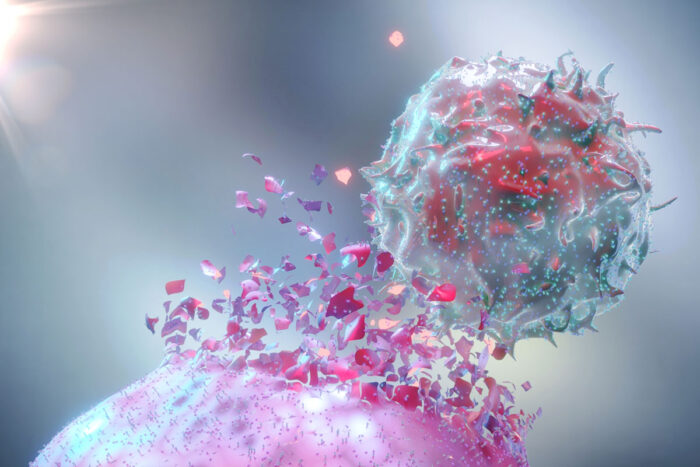$5 million grant supports innovative immunotherapies against blood cancers
Leukemia & Lymphoma Society supports trials in cell-based immunotherapies, cancer vaccines
 Getty Images
Getty ImagesThe Leukemia & Lymphoma Society (LLS) has given a $5 million grant to researchers at Washington University School of Medicine in St. Louis to support research aimed at developing new immunotherapies for different types of blood-based cancers. Shown is an artist's rendering of a natural killer cell — a type of immune cell — attacking a cancer cell.
Researchers at Washington University School of Medicine in St. Louis have received a $5 million grant from the Leukemia & Lymphoma Society (LLS) to support research aimed at developing new immunotherapies for different types of blood-based cancers.
The goal of this team science program — directed by Todd Fehniger, MD, PhD, and Brad Kahl, MD, both professors of medicine in the Division of Oncology — is to bring together established investigators whose research involves blood-based cancers, and to nurture collaborations among them that spark and enhance innovative translational studies with potential to improve patient care.
Two of the three projects funded will focus on genetically engineering different types of immune cells to target and attack blood cancer cells; and the third project will focus on developing personalized cancer vaccines based on the makeup of individual patients’ tumors. Each project includes an early-phase clinical trial, which will provide patients treated at Siteman Cancer Center — based at Barnes-Jewish Hospital and Washington University School of Medicine — with the option to participate in clinical trials of novel immunotherapies for specific blood cancers.
“All of these projects are innovative, cutting edge and address major unmet needs in blood-based malignancies,” said John F. DiPersio, MD, PhD, the Virginia E. & Sam J. Golman Professor of Medicine. “The projects are targeting different cancers, and they are unique in their immunologic approaches, using two different immune cell types in two of the projects and personalized vaccines in the third.”
The grant also provides funding for four resource cores to support critical areas common to all the projects, including an administrative core; a biospecimens and pathology core; a biostatistics and bioinformatics core; and an immunology core.
“This grant supports research projects and resource cores around the theme of using new immunotherapies to treat highly challenging lymphomas and related blood cancers,” Fehniger said. “This type of team science grant allows researchers from many disciplines to combine their expertise — including in immunology, genomics, bioinformatics and translational science — and develop new and innovative treatments for lymphomas and blood cancers that are very difficult to treat.”
The first project — led by Fehniger and Kahl — involves engineering the immune system’s natural killer (NK) cells to target specific cancer cells and make the NK cells more efficient at killing the cancer. The researchers will expose the natural killer cells to a chemical cocktail that activates the cells. They also will genetically engineer the cells to add a receptor that specifically targets B cell lymphoma. The engineered cells are called chimeric antigen receptor NK cells (CAR-NK cells), and they use the same strategy as CAR-T cells to target specific tumor cells.
A second project — led by DiPersio and Michael Rettig, PhD, a professor of medicine — involves gene editing of therapeutic T cells to kill cancer while preventing the T cells from targeting the patients’ own healthy cells. In this study, these “universal” CAR-T cells will be used to treat T cell cancers — including T cell non-Hodgkin’s lymphoma and T cell acute myeloid leukemia — while also preventing graft-versus-host disease. This disease is a sometimes life-threatening condition in which the therapeutic T cells that kill cancer also attack the body’s healthy tissues. The researchers will investigate how to help the therapeutic T cells persist longer in the body and enhance their cancer-killing capacity.
The third project — led by Robert Schreiber, PhD, the Andrew M. and Jane M. Bursky Distinguished Professor of Pathology & Immunology; Obi Griffith, PhD, an associate professor of medicine; Nancy Bartlett, MD, the Koman Professor of Medical Oncology; and William Gillanders, MD, a professor surgery — will target a type of cancer called follicular lymphoma. The researchers will develop individualized vaccines that stimulate and direct the immune system to kill a patient’s cancer cells. Cancer cells often produce unusual proteins on their surfaces. Vaccines that train the immune system to recognize these abnormal proteins — proteins that are always unique to a patient’s specific cancer — help the immune system identify and target the cancer cells for elimination.
“When immunotherapies work, they work in a remarkable way,” Schreiber said. “We are hopeful that this new funding will help us improve and expand upon the strategies we have to stimulate the immune system against specific cancers. The goal is to be able to target more cancers and make these therapeutic strategies effective for more patients.”






